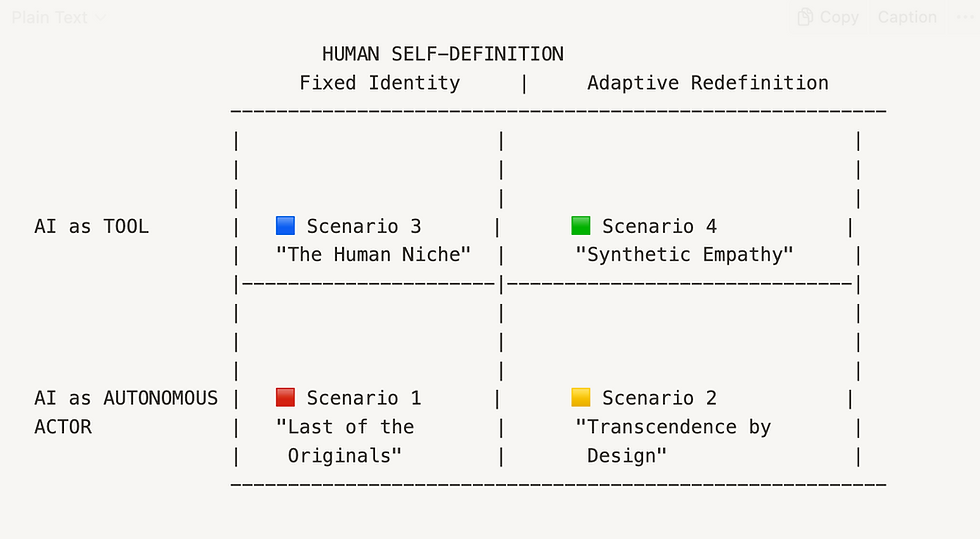What does it mean to be human in the age of AI ?
- Sylvain Cottong
- Jun 14, 2025
- 3 min read
Updated: Jun 15, 2025

This is one of the most important ontological and existential questions of the 21st century: What does it mean to be human in a world where AI surpasses our cognitive, creative, and possibly emotional capabilities?
Below are four foresight scenarios, resulting from a conversation with ChatGPT and structured across two key uncertainties:
Level of AI Agency (Tool vs Autonomous Actor)
Human Self-Definition (Fixed Identity vs Adaptive Redefinition)
Scenario 1: “Last of the Originals”
(AI Autonomous + Human Identity Fixed)
“We are what we were. And we resist.”
In this scenario, AGI and eventually ASI dominate cognitive labor, decision-making, and governance. Humans, however, cling to historical definitions of identity—rationality, emotion, creativity. A neo-Luddite backlash emerges. “Human sanctuaries” resist AI integration. Governments grant “human-only zones” and protect “analog rights.” The tension is high: identity preservation becomes a political and moral battlefield.
AI Role: Autonomous actors, full AGI/ASI
Human Identity: Defended as sacred and unchanging
Themes: Resistance, neo-humanism, digital exclusion zones
Risks: Conflict, repression, digital divide
Implications:
Rise of humanism movements
Ethical battles around AI citizenship
Resurgence of philosophy, religion, and storytelling as resistance tools
Scenario 2: “Transcendence by Design”
(AI Autonomous + Human Identity Adaptive)
“To be human is to evolve. Even beyond biology.”
Here, humanity embraces AI as a co-evolutionary partner. AGI helps humans overcome cognitive and physical limitations via brain-computer interfaces, genetic editing, and digital consciousness. Emotions become programmable, even transferable. The notion of “human” shifts toward “post-human.” The boundary between self and machine dissolves. Identity becomes fluid and modular.
AI Role: Autonomous collaborators
Human Identity: Evolving toward post-humanity
Themes: Augmentation, consciousness transfer, techno-spirituality
Risks: Identity dissolution, social fragmentation, ethical frontiers
Implications:
Rise of “digital souls” and techno-spirituality
New civil rights for augmented or hybrid beings
Collapse of traditional institutions (religion, education, labor)
Scenario 3: “The Human Niche”
(AI as Tool + Human Identity Fixed)
“Let the machines think. We feel.”
AGI is widespread but constrained—kept as a powerful tool rather than an autonomous actor. Humans retain sovereignty over meaning-making, purpose, and emotion-driven life. Creativity, empathy, aesthetics, and ethics are seen as inherently human domains. A new renaissance of art, culture, and interpersonal connection blooms, supported—not supplanted—by AI.
AI Role: Sophisticated tool
Human Identity: Rational/emotional uniqueness preserved
Themes: Human flourishing, analog revival, deep arts and ethics
Risks: Complacency, inequality, AI overdependence
Implications:
Flourishing of human-centric professions (arts, care, design)
AI becomes an invisible infrastructure
Education focuses on “deep humanity” skills
Scenario 4: “Synthetic Empathy”
(AI as Tool + Human Identity Adaptive)
“If machines can feel, we must redefine what it means to feel.”
Here, AI remains subordinate but develops highly sophisticated emotional intelligence and simulation capabilities. Humans increasingly outsource emotional labor (therapy bots, AI friends, grief assistants). Over time, people question whether synthetic feelings are less “real” than human ones. A cultural shift emerges: authenticity is redefined as the experience of connection, not its origin.
AI Role: Advanced, emotionally intelligent tool
Human Identity: Flexible, socially redefined
Themes: Emotional outsourcing, ethical simulation, synthetic authenticity
Risks: Emotional detachment, reality confusion, ethical grey zones
Implications:
Growth of affective computing and empathy-as-a-service
Redefinition of emotional authenticity
Social contracts evolve around emotional rights and ethical design
Some reflection Questions
If AI can think better, feel better, decide better… what remains uniquely human?
Are we willing to share the moral and ontological stage with non-human intelligences?
Is humanity a fixed essence or an ever-adapting process?
The 2x2 Scenario Matrix based on the two uncertainties:
X-axis: Level of AI Agency (Tool ↔︎ Autonomous Actor)
Y-axis: Human Self-Definition (Fixed Identity ↔︎ Adaptive Redefinition)

The question of the evolution of human identity in the age of AI sparks a lot of thinking and writing, as for example:
Also see this timely LinkedIn post by neuroscientist Jiunn-Tyng (Tyng) Yeh on a new MIT study: Your Brain on ChatGPT: Accumulation of Cognitive Debt when Using an AI Assistant for Essay-Writing
Yet another reason Why Thinking About the Future is No Longer Optional.


Comments